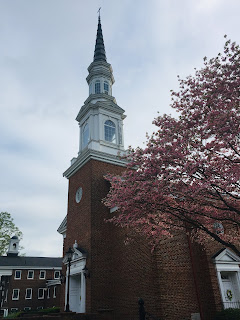Tomorrow is a day for new beginnings. Easter always is. Everyone has ordered lilies to adorn the sanctuary, many in memory of loved ones who have died, us included. I have a ham in the fridge waiting to be baked, Easter baskets shopped at Five Below filled with non-traditional things like sound-activated LED lights and a hands-free iPhone neck mount (for the teenagers) and chocolate. Yesterday we had readings about the Stations of the Cross and left the church in silence. We sang the hymns sung only once a year yet known by heart. "Oh Sacred Head Now Wounded," a bit gruesome, like hanging on a cross. The church lost power because we were under tornado warnings, but it didn't matter. Darkness was good.
Last year and this year Passover fell on Good Friday. Last year we shared a Passover meal with Jewish friends. It was a perfect transition--service at Friday noon, Passover meal in the evening, Holy Saturday then Easter Sunday. This year again it's a special time around the world. If you are one of these religions I hope for you all the blessings of your faith. For me that means chastened, watchful, hopeful, attuned to grief yet waiting on tiptoe in anticipation of resplendence. Spring must be a metaphor for all this!
In my mood for beginning fresh I've turned to Mary Oliver. Many of us feel that poets know more about us than we do ourselves. The only other poet Oliver reminds me of is Emily Dickinson. Christian imagery everywhere, but not confessions of faith, not like we see in Dante or Milton or Hopkins or Donne or the other great Christian poets. If you feel like reading about her, try "Why We Need Mary Oliver's Poems" by Debra Dean Murphy in The Christian Century, April 13, 2017 (www.christiancentury.org). In the meantime, here's an Oliver poem that I think offers just the freshness we might be longing for this special time of year.
WILD GEESE
You do not have to be good.
You do not have to walk on your knees
for a hundred miles through the desert, repenting.
You only have to let the soft animal of your body love what it loves.
Tell me about despair, yours, and I will tell you mine.
Meanwhile the world goes on.
Meanwhile the sun and the clear pebbles of the rain
are moving across the landscapes,
over the prairies and the deep trees,
the mountains and the rivers.
Meanwhile the wild geese, high in the clean blue air,
are heading home again.
Whoever you are, no matter how lonely,
the world offers itself to your imagination,
calls to you like the wild geese, harsh and exciting--
over and over announcing your place
in the family of things.












